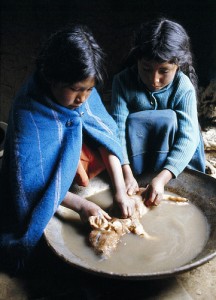U Boliviji, gde je među građanima učestalo formiranje sindikata, još jedna grupa radnika osnovala je svoj sindikat: deca.
Priču o deci koja rade u Boliviji predstavila je Žan Fridman-Rudovski u okviru serijala “Ground Shifters: Stories of Women Changing Unseen Worlds.” (One koje pomeraju tlo: Priče o ženama koje menjaju skrivene svetove). Rudovski piše:
Bolivia has 9 million inhabitants; one million are child workers, some who started working as early as seven. Of these, almost half are girls. The girls, like their jobs, are often hidden, inside homes or in the backs of restaurants.
Maurisio Ajra u blogu Bolivia Primera Plana [šp] tvrdi da dečiji rad ne zabrinjava bolivijsko društvo, i dodaje:
el anonimato en el que viven [los niños trabajadores] simplemente refleja el desprecio que siente el mundo adulto por la niñez en Bolivia.
Hispanically Speaking News je ranije izveštavao:
These children and adolescents work to help the family, to support themselves in their studies, to provide for their personal expenses, to secure themselves a better future compared to their fathers and brothers buried by silicosis and accidents in mines or plantations of sugar cane.
 Većina dece koja rade pohađaju školu i istovremeno uspevaju da obavljaju zahtevne poslove, a neka čak rade i puno radno vreme. Osnovala su sindikate da bi ih vlada zaštitila a društvo im ukazalo poštovanje. Kako Marion Gibni piše:
Većina dece koja rade pohađaju školu i istovremeno uspevaju da obavljaju zahtevne poslove, a neka čak rade i puno radno vreme. Osnovala su sindikate da bi ih vlada zaštitila a društvo im ukazalo poštovanje. Kako Marion Gibni piše:
these children do not view their situation as a bad one; they want to work, and formed these unions for their own benefit. The unions are meant to grant them protection and basic rights from the government, as well as to gain respect from others in the work force. Being children, they are often picked on and beat up by grown-ups, but they have learned to adapt and protect themselves.
S obzirom na to da je rad dece protivzakonit, teško je zatražiti od Vlade i njenih institucija zaštitu dece na radu. Noemi Gutjeres, mlada koordinatorka CONNATSOP, Svetovališta Ujedinjene dece radnika u Potosiju, kaže:
“Everyone says that kids shouldn’t work, but they are not taking into account the economic reality in this country. Sure, if we were all well off, none of us would have to work. But rather than thinking rationally, the government only says we need to eradicate child labor. I say, they ought to eradicate poverty first.”
Blog Children's Participation rezimira neke od zahteva UNATSBO-a (na španskom “Unión de Niños, Niñas, y Adolescentes Trabajadores de Bolivia”, u prevodu “Sindikat dečaka, devojčica i adelescenata radnika Bolivije”), najvećeg sindikata radnika dece u zemlji:
They want to ensure that children earn the same wages and have the same financial tools as their adult counterparts. In some sectors, they earn less than half the salary of their adult colleagues. Moreover, children don't have access to savings accounts and often give their earnings directly to their parents. Union members also lobby for safe work environments and for better medical care, especially for children whose jobs present a health risk.
The lack of recognition of children who work forms one of the major obstacles in achieving better living conditions for working children
Nedostatak priznavanja dece koja rade predstavlja jednu od najvećih prepreka da se omoguće bolji životni uslovi za decu radnike.






